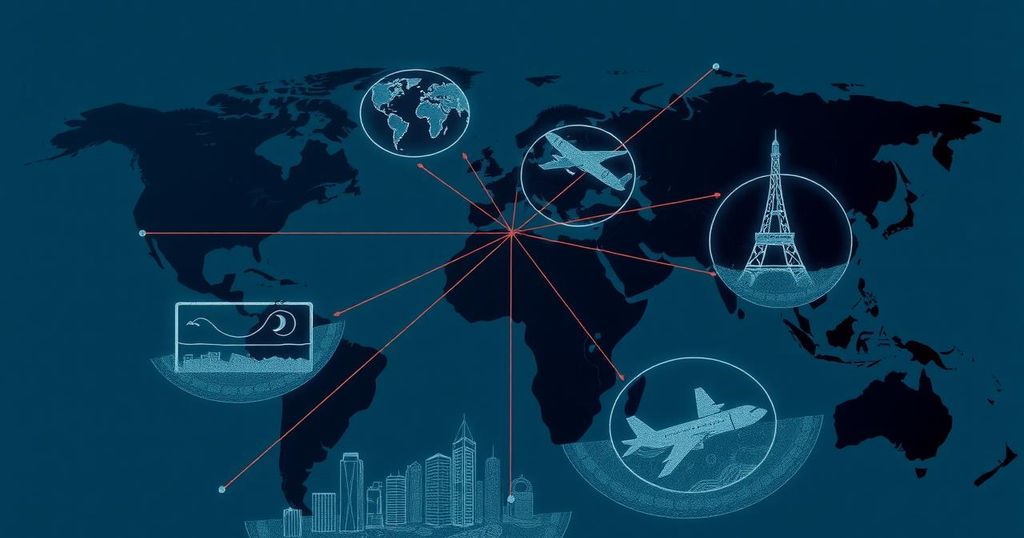World news
AFRICA, CUBA, DONALD TRUMP, JOE BIDEN, MYANMAR, NATIONAL SECURITY, NBC NEWS, NORTH AMERICA, POLITICS, SIERRA LEONE, SOUTH AMERICA, STATE DEPARTMENT, SUDAN, TRUMP, TRUMP ADMINISTRATION, TRUTH SOCIAL, U. S, U. S. STATE DEPARTMENT, U.S. ELECTIONS, US PRESIDENTIAL ELECTION, VENEZUELA
Marisol Gonzalez
0 Comments
Trump Issues New Travel Ban Affecting Nearly 20 Countries: What Travelers Need to Know
President Donald Trump has issued a new travel ban affecting nearly 20 countries, limiting entry for nationals from nations like Afghanistan, Iran, and others. The ban will take effect on June 9, 2025, promoting national security while raising concerns for travelers from the affected nations. Individuals seeking to travel to the U.S. should be aware of potential delays and consult legal guidance for entry eligibility.
President Donald Trump has recently signed a new travel proclamation, significantly impacting travel policies for nearly 20 countries, citing national security concerns. This sweeping ban will restrict or bar entry from nations including Afghanistan, Burma, Chad, the Republic of Congo, Equatorial Guinea, Eritrea, Haiti, Iran, Libya, Somalia, Sudan, and Yemen. Additionally, the proclamation includes partial travel suspensions for nations like Burundi, Cuba, Laos, Sierra Leone, Togo, Turkmenistan, and Venezuela, generating widespread attention and concern.
The White House has noted that the ban specifically targets those nations characterized by high visa overstay rates and deficiencies in screening and vetting processes. There are indeed echoes of Trump’s earlier travel restrictions from 2017, often referred to as the “Muslim ban” which sparked major protests and legal battles. Following Trump’s term, former President Joe Biden repealed this measure in 2021, condemning it as “a stain on our national conscience.”
Under the new measures, certain exceptions will be available for lawful permanent residents and current visa holders. However, it remains unclear what specific visa categories may qualify for these exceptions. As a result, applicants for tourism, work, and student visas from affected nations should prepare for possible delays or outright denials.
This implementation aligns with Trump’s campaign commitments for 2024 and has arisen in the wake of an antisemitic attack in Colorado, which prompted Trump to advocate for tighter border security via his social media platform. He stated on Truth Social that such attacks illustrate the need to enforce stricter borders and “deport illegal, anti-American radicals from our homeland.”
For international travelers, key details on the affected nations are as follows: the complete ban is directed at nationals from Afghanistan, Burma (also known as Myanmar), Chad, the Republic of the Congo, Equatorial Guinea, Eritrea, Haiti, Iran, Libya, Somalia, Sudan, and Yemen. Those from Burundi, Cuba, Laos, Sierra Leone, Togo, Turkmenistan, and Venezuela will face partial restrictions.
The travel restrictions are set to commence on June 9, 2025, at 12:01 a.m. ET, as reported by NBC News. Travelers who are from nations with full bans could be denied boarding by airlines or turned away upon arrival in the U.S. Nationals from the partially restricted countries may undergo extra scrutiny, delays, or possible denial of entry, depending on their visa status.
Individuals holding tickets to the U.S. from the affected nations should reach out to their airlines and nearest U.S. embassy or consulate for assistance. Although some exceptions may apply, many travelers from fully banned countries may be denied entry, while those from partially restricted nations might still travel but will face stricter vetting procedures.
Travelers are recommended to stay abreast of guidance from the U.S. Department of State and speak with immigration lawyers if they have concerns regarding their entry eligibility under this new prohibition. Those with questions about their status should be proactive in seeking information before their planned travel dates.
In summary, President Trump’s new travel ban will significantly limit entry for nationals from nearly 20 countries, reflecting ongoing national security issues. While some exceptions exist, travelers must navigate potential delays and complications. Travelers are urged to consult official resources and legal assistance to understand their specific situations, especially if they are from the listed nations. The travel restrictions officially take effect on June 9, 2025, raising important concerns for international travelers.
Original Source: www.usatoday.com




Post Comment